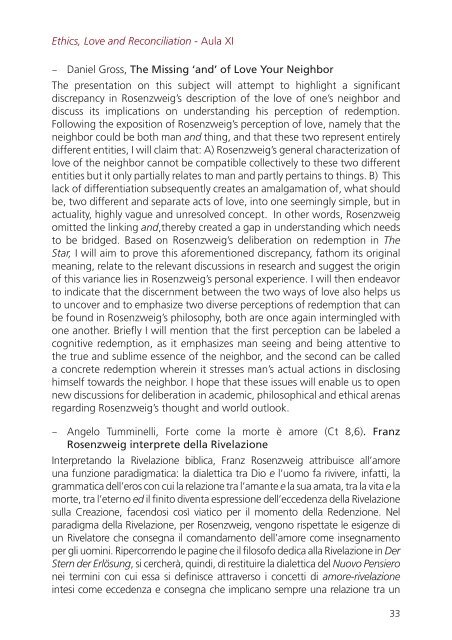Franz Rosenzweig
VZ2hG1
VZ2hG1
You also want an ePaper? Increase the reach of your titles
YUMPU automatically turns print PDFs into web optimized ePapers that Google loves.
Ethics, Love and Reconciliation - Aula XI<br />
– Daniel Gross, The Missing ‘and’ of Love Your Neighbor<br />
The presentation on this subject will attempt to highlight a significant<br />
discrepancy in <strong>Rosenzweig</strong>’s description of the love of one’s neighbor and<br />
discuss its implications on understanding his perception of redemption.<br />
Following the exposition of <strong>Rosenzweig</strong>’s perception of love, namely that the<br />
neighbor could be both man and thing, and that these two represent entirely<br />
different entities, I will claim that: A) <strong>Rosenzweig</strong>’s general characterization of<br />
love of the neighbor cannot be compatible collectively to these two different<br />
entities but it only partially relates to man and partly pertains to things. B) This<br />
lack of differentiation subsequently creates an amalgamation of, what should<br />
be, two different and separate acts of love, into one seemingly simple, but in<br />
actuality, highly vague and unresolved concept. In other words, <strong>Rosenzweig</strong><br />
omitted the linking and,thereby created a gap in understanding which needs<br />
to be bridged. Based on <strong>Rosenzweig</strong>’s deliberation on redemption in The<br />
Star, I will aim to prove this aforementioned discrepancy, fathom its original<br />
meaning, relate to the relevant discussions in research and suggest the origin<br />
of this variance lies in <strong>Rosenzweig</strong>’s personal experience. I will then endeavor<br />
to indicate that the discernment between the two ways of love also helps us<br />
to uncover and to emphasize two diverse perceptions of redemption that can<br />
be found in <strong>Rosenzweig</strong>’s philosophy, both are once again intermingled with<br />
one another. Briefly I will mention that the first perception can be labeled a<br />
cognitive redemption, as it emphasizes man seeing and being attentive to<br />
the true and sublime essence of the neighbor, and the second can be called<br />
a concrete redemption wherein it stresses man’s actual actions in disclosing<br />
himself towards the neighbor. I hope that these issues will enable us to open<br />
new discussions for deliberation in academic, philosophical and ethical arenas<br />
regarding <strong>Rosenzweig</strong>’s thought and world outlook.<br />
– Angelo Tumminelli, Forte come la morte è amore (Ct 8,6). <strong>Franz</strong><br />
<strong>Rosenzweig</strong> interprete della Rivelazione<br />
Interpretando la Rivelazione biblica, <strong>Franz</strong> <strong>Rosenzweig</strong> attribuisce all’amore<br />
una funzione paradigmatica: la dialettica tra Dio e l’uomo fa rivivere, infatti, la<br />
grammatica dell’eros con cui la relazione tra l’amante e la sua amata, tra la vita e la<br />
morte, tra l’eterno ed il finito diventa espressione dell’eccedenza della Rivelazione<br />
sulla Creazione, facendosi così viatico per il momento della Redenzione. Nel<br />
paradigma della Rivelazione, per <strong>Rosenzweig</strong>, vengono rispettate le esigenze di<br />
un Rivelatore che consegna il comandamento dell’amore come insegnamento<br />
per gli uomini. Ripercorrendo le pagine che il filosofo dedica alla Rivelazione in Der<br />
Stern der Erlösung, si cercherà, quindi, di restituire la dialettica del Nuovo Pensiero<br />
nei termini con cui essa si definisce attraverso i concetti di amore-rivelazione<br />
intesi come eccedenza e consegna che implicano sempre una relazione tra un<br />
33


